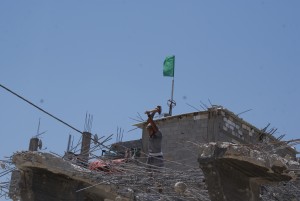Foreign hegemony or repressive self-rule in the Arab world
By Khaled Diab
The Arab world may debate the merits of external occupation versus repressive self-rule, but neither are acceptable.
24 February 2010
he al-Jazeera debate programme, al-Itijah al-Mua'kes (Opposite Direction), is well-known across the Arab world for tackling thorny, controversial and offbeat issues. Earlier this week, the show got stuck into the taboo question of whether Arabs, after decades of self-rule, were better off under the oppression of their current regimes or whether the yoke of the former imperial powers was preferable.
At one point, the programme's moderator Faisal al-Qassem described the modus operandi of Arab leaders as a form of internal imperialism and said that some were of the view that home-grown colonialism, which consumes the body from within, was tougher to combat than foreign occupation, which behaves more like an external parasite.
As is the format of al-Itijah el-Mua'kes, the two guest panellists had opposing views on the topic. One, a member of an Arab parliament, was of the opinion that no matter how bad local rulers were, they were preferable by far to a foreign occupier whose sole concern is the pillaging of a society's resources and the subjugation of its people. In contrast, local leaders ultimately have the interests of their society – or at least parts of it – at heart and, with reform, self-rule can be made to work.
The other, a lawyer with the International Criminal Court, argued that the European powers brought the Middle East into the modern age and set it on the road to progress. In some cases, he opined, there had not been much progress since. As an example, he referred to the railways in Sudan, which were built by the British but have not been improved by the Sudanese.
Despite the eccentricity of these views, they seem to have a certain resonance with ordinary Arabs. Surprisingly, some two-thirds of respondents to an online poll conducted by al-Jazeera were of the view that their countries had been better off under colonial rule.
Of course, polls of this kind are unscientific, the make-up and demographic spread of the respondents are unknown and the sample size was too small (6,808). Nevertheless, the result is an interesting one, and it speaks volumes of the frustration felt by ordinary Arabs, caught as they are between the rock of repressive rule and the hard place of foreign hegemony.
Long gone, it would seem, are the days of heady, post-independence optimism in which Arabs believed that, after shaking off the shackles of centuries of European and Ottoman rule, a new golden age was about to be born.
So, which is better? Well, as with most things, the issue is neither black nor white because the track records of both imperialism and self-rule have been patchy. In addition, the diversity of imperial and post-independence experiences are enormous. Moreover, even within a single empire, performance changed dramatically over time and the colonial experience in each country was marked by key differences.
In the Arab world, the early centuries of Ottoman rule, for example, were relatively benign, tolerant and prosperous, but the latter period was increasingly repressive and stagnant. In their favour, the European powers brought in ideas of modern science and the Enlightenment, helped abolish slavery and sparked Arab interest in modern technology.
On the negative side, they often stripped countries of their resources, put in place repressive colonial power structures which were perpetuated by local rulers, and, intentionally or unintentionally, planted many of the seeds of the internal and cross-border conflicts that plague the region to this day.
Algeria, for example, is still staggering from the wounds of having once been annexed by France, with the mass displacement of the peasantry and the marginalisation of the urban professional classes that this involved. In addition, the roots of the bloody north-south conflict in Sudan, and the massacres in Darfur, can be traced back to the destructive period of Anglo-Egyptian rule.
The record of self-rule is also difficult to assess and compare, partly because the Arab world of today is so very different from that of colonial times. On the plus side, self-rule has led to massive improvements in such areas as education and healthcare. In addition, a number of post-independence regimes embarked on huge and ambitious programmes to industrialise, with mixed results.
On the negative side, most domestic regimes have been as oppressive in their handling of the population as the former colonial powers, and human rights abuses in many countries are rife. An extreme example of this would be Saddam Hussein and his murderous rule. But, then again, those who dream of a return to colonial rule would do well to examine the case study of contemporary Iraq, where the US-led occupation is giving the country's former dictator a serious run for his money in terms of destructiveness and malignancy.
In fact, the question posed by al-Jazeera is perhaps the wrong one, since, in many ways, colonial rule has not ended. Although direct rule stopped more than half a century ago, with the exception of Iraq since 2003, indirect rule never ceased. In broad terms, the region's regimes fall into two general categories: those who have accepted the role of client states and those who have opposed it and been punished and “contained” for stepping out of line. Then, there's the privatisation and franchising of imperialism to multinationals.
So, in reality, today's Arabs are living under the crushing burden of domestic and foreign imperialism. To my mind, the issue is not which one is better but how to bring both to an end.
This column appeared in The Guardian Unlimited's Comment is Free section on 19 February 2010. Read the related discussion.


